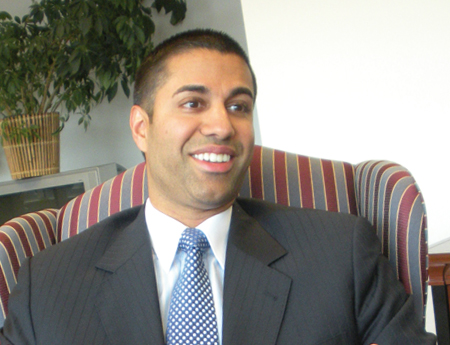Pai’s Bully Pulpit Grab Leads to Pushback

The smarter way to stay on top of broadcasting and cable industry. Sign up below
You are now subscribed
Your newsletter sign-up was successful
FCC chairman Tom Wheeler has used his “bully pulpit” powers to get broadcasters and cable operators to commit to improving their closed captions and wireless companies to agree to cellphone unlocking. But he has the ability to back that “speak softly”—and sometimes loudly, as with cellphones— approach with agenda items and FCC bureau actions.
Meanwhile, FCC commissioner Ajit Pai has managed to parlay his own bully pulpit into one of the highest profiles for a minority commissioner in recent memory, including appearances on cable news networks and headlines generated in major newspapers.
Pai recently has been heralded in some quarters as something of a First Amendment savior. This came in the wake of the FCC modifying a study of the critical information needs of communities that would have asked media outlets how and why they covered news stories. Wheeler initially said he was changing the methodology; then the FCC later put out a statement that the Columbia, S.C., test market for the study would not be up and running until that methodology was changed, and that neither it nor any other market studies would poll journalists or media owners about their news coverage.
The study methodology was put out for comment under the watch of then-acting chairman Mignon Clyburn, who last week defended it, saying she would never try to shape the news or chill speech.
Pai had been skeptical, and critical, of the study from the outset, particularly the questions it was asking about coverage decisions made by journalists. But he did not control the agenda; at the time, Clyburn did. And, being a supporter of the study, she scheduled the pilot.
If Pai’s efforts helped bring about the recent pushback, he had help. House Republicans urged Wheeler to respond to questions about the study, which they also feared was an effort to micromanage news coverage under the guise of studying the impact of media ownership on diversity.
But Pai’s February op-ed piece in The Wall Street Journal, followed by his appearances on Fox News and CNN, were followed soon after by an announcement out of the FCC that the study would not poll journalists or station owners.
The smarter way to stay on top of broadcasting and cable industry. Sign up below
Pai’s op-ed also prompted a Fox News reporter to ask about the study at the daily White House briefing. In response, press secretary Jay Carney suggested the reporter “go ask the FCC.”
A USA Today story last week also appeared to confirm the connection: “Who knows what would have happened if an FCC commissioner who opposed the study, Ajit Pai, hadn’t gone public with a Wall Street Journal op-ed? That’s what galvanized the flurry of attention that doomed the ill-advised initiative.”
Pai’s immediate predecessor, Robert Mc- Dowell, who made getting rid of the Fairness Doctrine and warning about international efforts to manage the Internet key issues, knows a little something about getting attention without having the gavel.
“Minority commissioners have a tremendous platform to highlight issues and shape the agenda through speeches and op-eds,” McDowell, now a Hudson Institute visiting scholar, told B&C. “That’s because members of Congress and the news media like conflict, and therefore pay attention to some of these actions, which can be quite effective in shaping a policy debate and eventually producing results.”
INFORMATION PLEASE
The FCC’s process reform report, which chairman Tom Wheeler says should be put into action, includes a request for groups filing comments in FCC dockets to make the kind of disclosures that Hill Democrats were pressing the FCC to seek from groups buying political ads.
The report advises the FCC’s office of general counsel to draft an order recommending the agency adopt rules that groups filing comments have to identify who is backing them. The issue of who is the “real party in interest” in such proceedings was teed up in a 2011 notice of proposed rulemaking.
“Disclosure of the real party-in-interest behind FCC filings would help the agency, other parties and the public evaluate the credibility of factual and policy arguments by knowing who is making them,” the report advised. “It would also increase public confidence in our decisionmaking process by making clear that the Commission is aware of the source of the arguments before it. Such rules would allow all interested members of the public, not just industry insiders, to know who is attempting to influence the agency’s decision-making process.”
Contributing editor John Eggerton has been an editor and/or writer on media regulation, legislation and policy for over four decades, including covering the FCC, FTC, Congress, the major media trade associations, and the federal courts. In addition to Multichannel News and Broadcasting + Cable, his work has appeared in Radio World, TV Technology, TV Fax, This Week in Consumer Electronics, Variety and the Encyclopedia Britannica.

